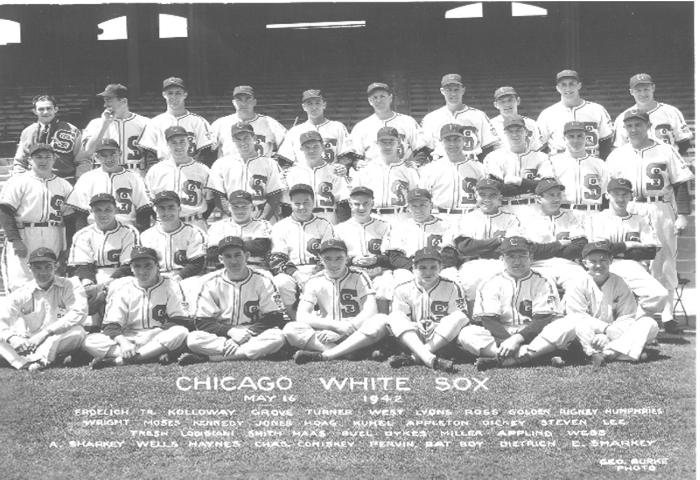
In these days of multi-million-dollar contracts, the fine immediately relegates the Highland Park resident to a whole different era of baseball. Indeed, C. P. Mosely, president of the East Texas League, mailed the letter in question to Wells on June 8, 1938. Wells was making $125 a month at the time. Although he eventually made it to the big leagues, playing for the Chicago White Sox in 1942 and '46 ('after three years of wartime service in the Coast Guard), his salary never topped $10,000 a year.
But you can't reckon the value of good memories. The letter from C. P. Mosley, for instance, is priceless, a relic from a bygone age. It reads in part:
"It really is none of your business just what an umpires decision
may be, since you draw your check just so long as you please the owner
and manager. Hence this is your notice that you are being fined the above
mentioned amount, viz., $5.00, and this is your official notice that the
payment must be in this office not later than June 17... l trust that this
will be the last time this year it will become necessary to make any assessment
against your salary since you are a young ballplayer and you do not get
promotions in baseball by disputing umpires and making yourself seen by
riotous actions."

Wells, born in Kansas and raised in California also has plenty of good memories about the two seasons he played in St. Paul, in 1939 and 1941, with the American Association Saints.
"In 1939," he said, "we opened on the road, and I remember coming up the river on the: Zephyr from Chicago and seeing downtown St. Paul for the first time. Here I was, a young guy of 22 just a utility infielder but I thought, ‘I’m representing this city.’ I was thrilled. Especially when we went to Kansas City later and played my old home town."
He must have been thrilled in1941; too, when he set a fielding record for the Saints and was named most valuable player. But back then he never would have guessed that he would end up living in St. Paul when his baseball career ended in 1950.
"It was a combination of things," said Wells, who has lived on Highland Parkway for the past 18 years. "It all tied together. Although I had enjoyed my two summers in St. Paul, I was really leaning to California as a permanent residence."
The combination included his marriage to a St. Paul girl, Alice Hull, in 1942. It was her connections that led Wells to an off-season job selling life insurance in the area. Even more important was that the Children’s Home Society here was ready to provide the Wells with the baby they wanted to adopt after finding out they could not have children of their own. Leo and Alice subsequently adopt three other children, and over the years temporarily housed children while the society searched for suitable foster parents.
Meanwhile, Wells was becoming successful in the life insurance business, first as an agent for Equitable Life, where he has been for 31 years. Trim and healthy at 72, Wells still goes to his office daily when he's in town. Alice Wells died three months ago, just short of their 47th wedding anniversary.
Wells has not really maintained his ties with baseball since retiring from the sport though he said he still gets about 125 autograph requests every year, mostly by mail. He used to watch the Twins occasionally at the old Met Stadium, but he's not too big on indoor baseball, and rarely goes to the Metrodome. He doesn't mind talking about his baseball days, however.
One of his favorite stories involves the time he was with the Indianapolis
Indians and repaid the kindness of the St. Paul Saints by being a key figure
in their elimination from the 1950 playoffs.

Alice was staying with her parents in St. Paul, and because of his past affiliation with the Saints, Wells was al-lowed to hitch a ride on their special train here from Indianapolis so he could spend an extra day with his beloved. But friendship only goes so far.
Wells got the hit that beat the Saints in the third game of the series, but that wasn't even the worst of it. In the fourth and final game at the old Lexington Park (located just off University Avenue and Lexington Parkway) the score was tied in the last of the ninth and the Saints had runners on first and second with no outs.
St. Paul's slugging Lou Limmer ripped a liner toward right, but the Indians' first baseman speared it and stepped on the bag for two outs before throwing to Wells at second. Jack Cassini, the other base runner for the Saints, was already halfway to third when Wells held the ball on high, stepped on Second base and shouted out, "Guess what I've got here, Jack."
The triple play sent. the game into the l0th inning, where the Indians scored to complete their playoff sweep. Notwithstanding his role in that game, Wells has fond memories of his own days with the Saints. "Lexington Park was pretty old by then, but it was still a good stadium," he said. "And the infield with the Bossards as groundskeepers was the best-kept infield of any I played on in the minor leagues.
"I also remember the fans coming out to the ballpark on streetcars," he said. "I didn't have to that because both years I played in St. Paul I lived within walking distance of the park. But those people really knew their baseball. They were great sports fans and they were always friendly. That's probably what I remember most about St. Paul-the people. They were just great."
 |